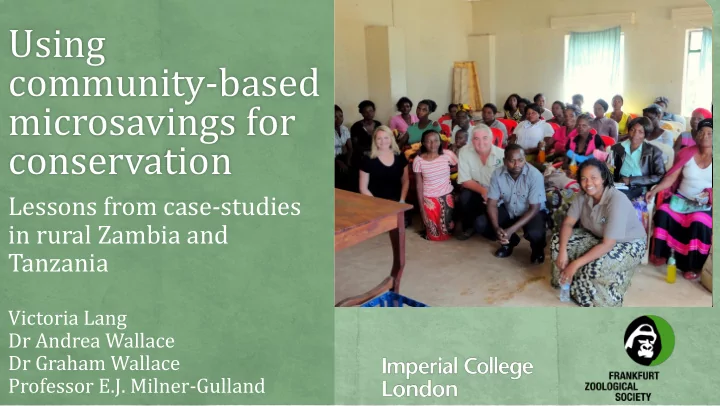

Using community-based microsavings for conservation Lessons from case-studies in rural Zambia and Tanzania Victoria Lang Dr Andrea Wallace Dr Graham Wallace Professor E.J. Milner-Gulland
Framework of COCOBA success factors Overview
Evolution from microfinance towards microsavings Institution led Community led Microsavings for microfinance microsavings conservation 1980s -> c.2007 Mid-2000s 1990s Formal Limited use to Group savings; microfinance date: loans to institutions FZS, WWF & FFI members (MFIs)
North West Tanzania Serengeti COCOBA Zambia North Luangwa Community Conservation Banks
Methods 1. Focus groups Zambia Tanzania Members 3 Members 6 Non members 2 Non members 3 Men 2 Men 3 Women 3 Women 3 Mixed - Mixed 3
Methods 2. Key informant interviews Name Organisation Dr. Graham Wallace FZS-CREATE Dr. Andrea Wallace FZS-CREATE Florentina Julius FZS-CREATE Bennett Siachoono FZS-CREATE Bornface Chibulu Village rep. Monica Chapatuka Village rep. Dr. Nicholas Hill ZSL Martin Kourouma CARE, Guinea
Methods 3. Structured interviews Zambia Members 65 Non members 65 Women 95 Men 35
Framework of COCOBA success factors Results Findings
COCOBA membership was associated with higher wealth scores Wealth scores of members and non-members 25 Wealth Index 20 15 10 5 Member Non Member Wealth index was based on an asset register index, including house &roof materials and ownership of household assets and livestock
COCOBA members reported greater positive wellbeing changes Perceived wellbeing changes of members and non-members 1.0 Mean wellbeing change score Members *** Non Members *** ** 0.8 *** *** 0.6 0.4 0.2 0.0 Respect Food & diet Children Financial Household Household Household Life in education Indep. income assets condition general Score of 1=improved, 0=no change, -1 = reduced over last 6 years Chi- squared tests performed for all except children’s education (Fisher’s exact)
Attitudes towards conservation were more positive amongst COCOBA members Conservation attitude scores of Zambian members and non-members “Before COCOBAs I didn’t Conservation attitude score 16 know the importance of not killing wild animals or cutting 12 trees but COCOBA members 8 discourage these activities so I 4 have stopped” 0 Members Non-Members Scoring of 7 Likert scale qu’s : strong positive=+2, positive=+1, negative=-1, trong negative=-2. Max score for any participant=14, minimum score=-14
Pro-conservation behaviour changes were reported by COCOBA members Reported behaviour changes of Zambian members due to COCOBAs Advise or prevent others Stopped cutting trees Stopped buying bushmeat Stopped poaching Protects environment Responsible farming Plant trees in village Report to Government Authority (ZAWA) 0% 10% 20%
Non-members placed more weight on the financial benefits of COCOBAs than members Perceptions of COCOBA benefits to community Proportion of respondents 50% Members Non Members 40% 30% 20% 10% 0%
Discussion
Conservation implications of our COCOBA research COCOBAs were associated with greater wealth and 1 improvements in wellbeing, which is linked to reduced reliance on environmentally damaging practices
Conservation implications of our COCOBA research COCOBAs were associated with greater wealth and 1 improvements in wellbeing, which is linked to reduced reliance on environmentally damaging practices COCOBA members reported positive attitudes towards 2 conservation, which can influence behavioural intentions and potentially actual behaviour
Conservation implications of our COCOBA research COCOBAs were associated with greater wealth and 1 improvements in wellbeing, which is linked to reduced reliance on environmentally damaging practices COCOBA members reported positive attitudes towards 2 conservation, which can influence behavioural intentions and potentially actual behaviour COCOBA members indicated that themselves and others in community had made 3 pro-conservation changes in behaviour
Conservation implications of our COCOBA research COCOBAs were associated with greater wealth and 1 improvements in wellbeing, which is linked to reduced reliance on environmentally damaging practices COCOBA members reported positive attitudes towards 2 conservation, which can influence behavioural intentions and potentially actual behaviour COCOBA members indicated that themselves and others in community had made 3 pro-conservation changes in behaviour The diversity of perceived benefits of COCOBAs provides scope to target many sectors of communities 4 for greater conservation impact
Key factors for COCOBA success SAVINGS & ONGOING TRAINING SENSITISATION RECRUITMENT LOANS OPERATIONS Initially: NGO Ongoing: COCOBA members AWARENESS Initial training Capacity building TRAINING External (NGO) SUPPORT Internal (community trainer-training) CULTURE Group culture, leadership & cohesiveness Ongoing OPERATIONS Structure & roles Financial business
Acknowledgements With thanks to my … and to the following supervisors... organisations for supporting my research Dr. Andrea Wallace Dr. Graham Wallace Professor E.J. Milner-Gulland … and to FZS -CREATE staff in Zambia and Tanzania…
Many thanks Questions? All photos taken by Victoria Lang
Recommend
More recommend